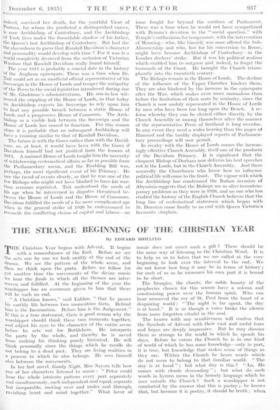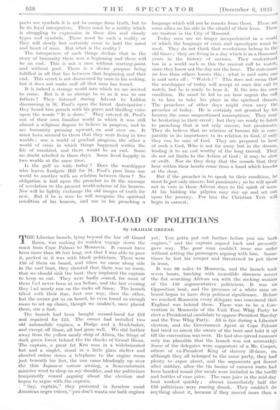THE STRANGE. BEGINNING OF THE CHRISTIAN YEAR
By EDWARD SHILLI TO THE Christian Year begins with Advent. . It begins • ..with a remembrance of the End. Before we see the, acts one by one we look: swiftly ,at the end of the drama.. We see the pattern of the whole scene, and then we think upon the • parts-. Before we follow for. yet • another time the movements of the divine music we hear the finale in which all the themes are inter- Woven and fulfilled.. • At. the. beginning of the year the worshipper has an assurance given to him that there Will be such an end. • " A Christian knows,". said Liddon, " that he passes his earthly life between two momentous facts. Behind him is the Incarnation. Before himis the Judgement." If this is a true statement, there is good reason why the worshipper should think these two moments together,• and adjust his eyes to the character. of the entire scene before he sets. out , for Bethlehem. • He interprets the parts by the whole, and thereby. he • is • :saved from making his thinking purely historical. He will think personally since the things which he recalls do. not belong to a dead past. They are living realities in a process to which he 'also belongs. He - sees:' himself also between the movements. • • In her last novel, Gaudy. Night, Miss. Sayers tells how one of her characters listened . to • music c " Peter 'could hear, the whole intricate pattern every part separately and simultaneously, each independent and equal; separate but inseparable, moving over and under,. and ...through; ravishing : heart and • mind together." - What lover of music does not covet such a gift ? There should be the same way of listening to the Christian Word. It is to help us so to listen that we are called at the very beginning to look over the interval to the end. • We do not know how long it may be in terms of history ; for each of us as he measures his own part it is bound to be short: The liturgies, the chants, the noble beauty of the prophecies chosen for this season have a solemn and constraining power over the human spirit. Who can. hear unmoved the cry of St. Paul from the heart of a despairing world : " The night is far spent, the day is at hand." It is as though a voice broke the silence from some forgotten citadel in the soul. . The hearer with any sensitiveness will confess that the Symbols of Advent with their vast and awful fears and hopes are deeply impressive. But he may dismiss. them as strange to the world in which he spends his days. Before he enters the Church he is in one kind, of world. of which he has some knowledge—only in part; it is true, but knowledge that makes. sense of- things as. they are. Within the Church he: hears words which: do not seem to belong to that. familiar • world. " The . day is at hand ; but what day is this ? ". Lo, He comes with clouds descending " ; . but what do such words in hymns mean in the homely, language which he uses outside the Church ? Such a worshipper is not comforted by the answer that this is poetry he knows that, but because it is poetry, it should be truth ; when poets use symbols it is not to escape from truth, but to be its loyal interpreters. There must be a reality which is struggling to expression in these dim and cloudy types and symbols. There must be such a reality or they will slowly but certainly cease to hold the mind and heart of man. But what is the reality ?
The interpreters of such things. declare that in the story of humanity there was a beginning and there will be an end. This is not a race without starting-point and without goal. There is a divine purpose being fulfilled in all that lies between that beginning and that end. This secret is not discovered by man in his seeking, but it does not make null all that man has found.
It is indeed a strange world into which we are invited to come. But is it so strange to us as it was to our fathers ? They listened during Advent to Liddon discoursing in St. Paul's upon the Great Anticipation ; they heard him preach with his grave and thrilling voice upon the words " It is done." They entered St. Paul's. out of their own familiar world in which it was still. almost a religious dogma to believe in progress, and to see humanity pressing upward, on and ever on. It must have seemed to them that they were living in two worlds : one a world of gradual progress, the other a world of crisis in which things happened within the life of mankind, and there would be an end. Some no doubt rebelled in those days. Some lived happily in two worlds at the same time.
Is the gulf as wide today ? Does the worshipper who leaves Ludgate Hill for St. Paul's pass from one world to another with no relation between them ? No obligation is laid upon the preacher to fit the message of revelation to the present world-scheme of his hearers. Nor will he lightly exchange the old images of truth for new. But if he is wise he will recognise the spiritual. condition of his hearers, and use in his preaching a language which will not be remote from them. There aro some allies on his side in the citadel of their lives. There are traitors in the City of Mansoul. Today men are no longer inexperienced in a world of which the language of crisis and apocalypse must be used. They do not think that revolutions belong to the old times ; they are living in a day which is as a thousand years in the history of nations. They understand too in a world such as this the ancient call to watch, since they know not the day nor the hour. The statesman no less than others knows this ; what is said unto one is said unto all : " Watch ! " This does not mean that the worshipper of today will accept at once this call to, watch, but he is . ready to hear it. It fits into his own- condition. He must be led to see how urgent the call, is to him to take his place in the spiritual drama. The preachers of other days might even envy the preacher of today. He is certainly not granted by his hearers the same unquestioned assumptions. They may' be hesitating in their creed ; but they are ready to listen to preaching that is not only sincere, but passionate.. They do believe that no relation of human life is corn-, parable in its importance to its relation to God, if only they can be sure of God. They are prepared to hear of such a God, Who is not far away but in the drama, leading it to an end worthy of the long travail. They do not set limits to the Action of God ; it may be slow or swift. Nor do they deny that the sounds that they hear within their hearts come from a hand which knocks at the door.
But if the preacher is to speak to their condition, he must bcpot only sincere, but passionate; so he will speak not in vain in these Advent days to the spirit of man. At his bidding the pilgrim may rise up and set out upon the journey. For him the Christian Year will. begin in earnest.













































 Previous page
Previous page